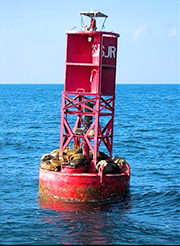Bell buoys and whistle buoys have long served as a source of guidance for incoming vessels of all sizes, as well as harbingers of approaching danger. But they’ve never been known as a choice place to hang out for a night. But 31 years ago, Robert “Bo” Curtis proved that notion wrong when he tied himself to a buoy in Maine’s West Penobscot Bay on a cold January morning. He would spend 27 hours on that buoy.
Curtis’ story was retold this month in a June 13 Bangor Daily News article. The then-25-year-old clammer left Rockland on Jan. 15, 1984, in a 15-foot skiff with a 40-hp outboard bound for a clamming trip on North Haven Island. That’s about nine miles away, across the bay.
Sure it was winter, but a clammer has to get in his digging time if he’s going to make any money. Besides, the forecast put the seas at no more than 3 feet and winds 5 to 15 mph. Curtis figured he could handle that.
But once out past Rockland’s breakwater and into the bay, the weather deteriorated and a squall moved across the water, bringing with it 5-foot waves and winds of 40 mph. That pushed Curtis down the bay. He knew he was in trouble as his small skiff started to fill with water.
Some three miles south of Vinalhaven Island, he came upon an 8-foot-tall whistle buoy. He decided to tie his boat to it, hoping he could wait out the weather. As he stepped on the buoy, a wave knocked his boat out of reach; engine idling and with his supplies aboard, it drifted away. That was 10:45 in the morning.
To keep from being tossed off the buoy as it was rolled with the swells, Curtis removed his belt, looped it through a bar on the buoy and then through two belt loops on his pants.
Curling up in a fetal position on top of his down vest, he pulled his sweater down over his knees trying to stay warm. Three things got him through the night, as a lobster boat passed in the distance and a helicopter flew overhead: hip boots, a Bic lighter — not on every fisherman’s survival list — and a refusal to panic.
Throughout the night and the next day, Curtis used his teeth to pull strips of rubber off his boots and then lit them under his sweater with the Bic lighter to provide heat. At the very beginning of his ordeal, Curtis resolved not to panic and to constantly think through his ordeal. Excluding a minor lapse when he almost went into the water “to get it over with,” that attitude pulled him through until 2 p.m. the following afternoon when the Coast Guard vessel Point Hannon arrived and took him off the buoy.
He suffered frostbite and lost several fingernails and toenails. Today he is lobstering. Curtis later summed it up by telling the reporter: “All fishermen have close calls from time to time.”







.jpg.small.400x400.jpg)